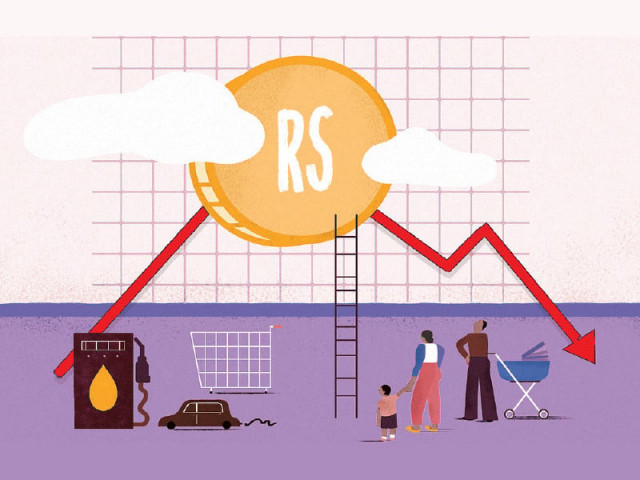Budget accelerates inflation in July
Month-on-month reading hits 8-month high due to taxes slapped in budget

The month-on-month (MoM) inflation rate reached an eight-month high of 2.1% in July compared to the pre-tax-loaded period, impacting the consumers of food items the most due to direct and indirect taxes on supplies and sales.
The pace of inflation rose 2.1% compared to the preceding month, reported the Pakistan Bureau of Statistics (PBS) on Thursday - the highest since November last year.
The reading shows higher inflationary pressures as the monthly index normally stands around 1%.
The impact was more pronounced in cities where the new tax measures hit the consumers hard. The monthly food inflation in July came in at 4.5% in urban centres – the highest since March 2023.
The coalition government has imposed a record Rs1.8 trillion in new taxes in the new budget for winning a $7 billion bailout package from the International Monetary Fund (IMF). Taxes have been slapped on the salaried persons and the consumable goods used mostly by all segments of society, irrespective of their income levels.
Finance Minister Muhammad Aurangzeb said on Thursday that the IMF board was expected to approve the lending package by the end of August. He said that discussions with bilateral creditors for the rollover of cash deposits were also underway.
There was a significant increase in prices of those items which had either been affected by the imposition of sales tax or 2.5% withholding tax on their supplies.
The average wheat flour price of a 20kg bag increased by Rs170, or 10%, to Rs1,943 in July over the preceding month.
Likewise, owing to 10% sales tax on poultry feed, chicken prices rose by 12% to Rs382 per kg compared to the pre-budget month. Powdered milk got expensive by 17%, or Rs140, to Rs992 per pack following the imposition of sales tax and withholding tax. PBS data revealed that sugar prices increased to an average of Rs146 per kg. The price was higher by Rs6 per kg compared to the ceiling set by the government at the time of allowing export of 150,000 metric tons in June.
Millers had agreed that they would not let prices shoot above Rs140 per kg. The Economic Coordination Committee (ECC) has not yet taken notice of the violation of its decision.
As expected, the Pakistan Sugar Mills Association has refused to accept the blame for the price hike, saying it could not control market forces. But the association had told the government that it would make sure that sugar prices did not go up after exports.
Instead of taking any punitive measures, the Sugar Advisory Board on Thursday recommended giving permission for export of another 40,000 metric tons. This may push prices above Rs150 per kg.
The association has also sought a 15-day relaxation in deadline for the export of the previous 150,000 tons. PBS reported that the Consumer Price Index (CPI)-based annual inflation stood at 11.1% in July compared to a year ago.
The rate receded due to a high base impact as the reading was at 28.3% in July last year. The 11.1% inflation was lower than the recent forecast of the Ministry of Finance.
The central bank has cut its policy rate to 19.5% this week, which is still higher, compared to the prevailing inflation rate. For the new fiscal year, the government has set the inflation target at 12% but the IMF sees a significantly higher pace. The annual inflation rate in urban areas was recorded at 13.2% while it was 8.1% in villages last month, according to the national data collecting agency.
PBS data showed that food inflation accelerated in both cities and rural areas. On an annual basis, in urban centres, there was an increase of 3.1% in the food inflation and it remained at 1.3% in villages and towns.
However, the month-on-month food inflation in urban centres was at a higher level of 4.5%, which was a 16-month high due to the inflationary budget. Non-food inflation in urban areas stood at 20.7% and in rural areas it was 15.5%.
Core inflation, calculated after excluding energy and food items, slightly slowed down to 11.7% in urban areas. It also slowed to 16.9% in rural areas. Average core inflation is now almost 5.3% lower than the policy rate. On a month-on-month basis, in the food group, tomato prices increased 76%, fresh vegetables rose 30%, milk powder 17% and pulses 15%.
In the budget, the government has imposed an 18% tax on the import of fruits and vegetables from Afghanistan and slapped 10% tax on poultry feed – the cost consumers will pay in the shape of higher prices.


















COMMENTS
Comments are moderated and generally will be posted if they are on-topic and not abusive.
For more information, please see our Comments FAQ